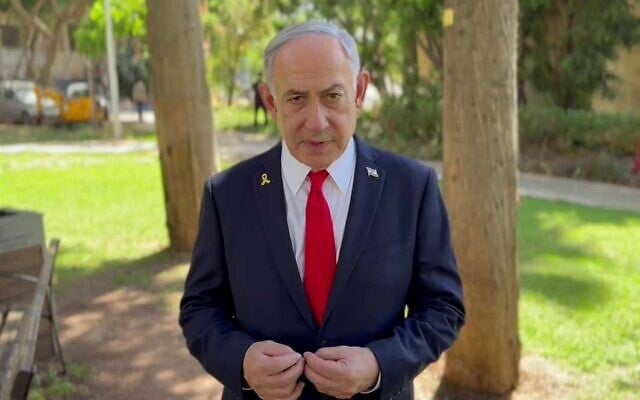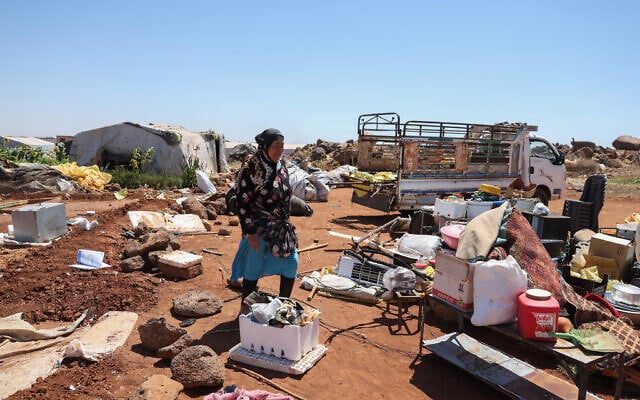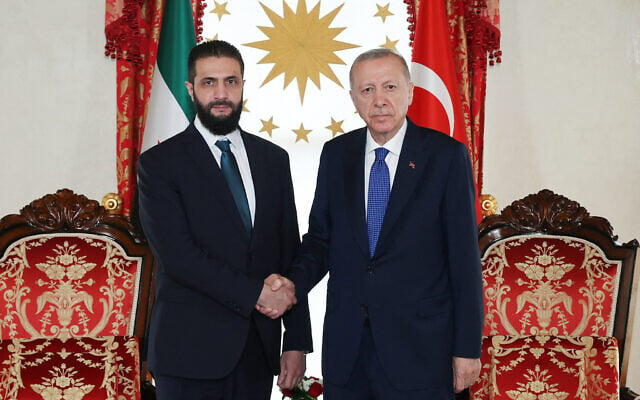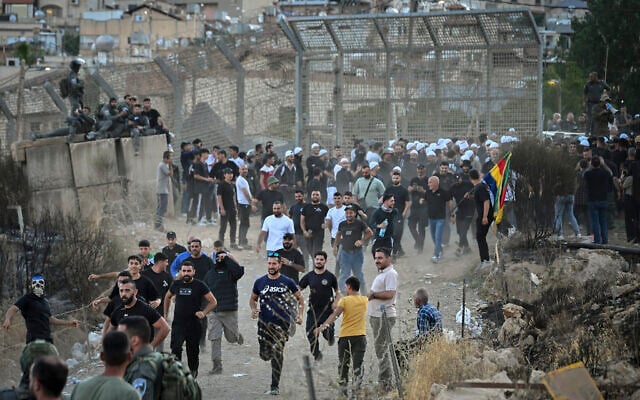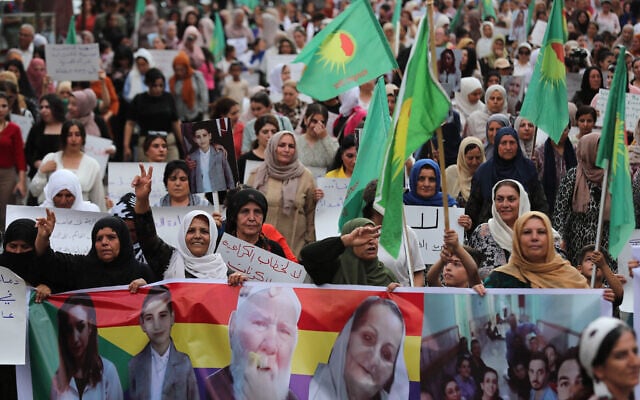


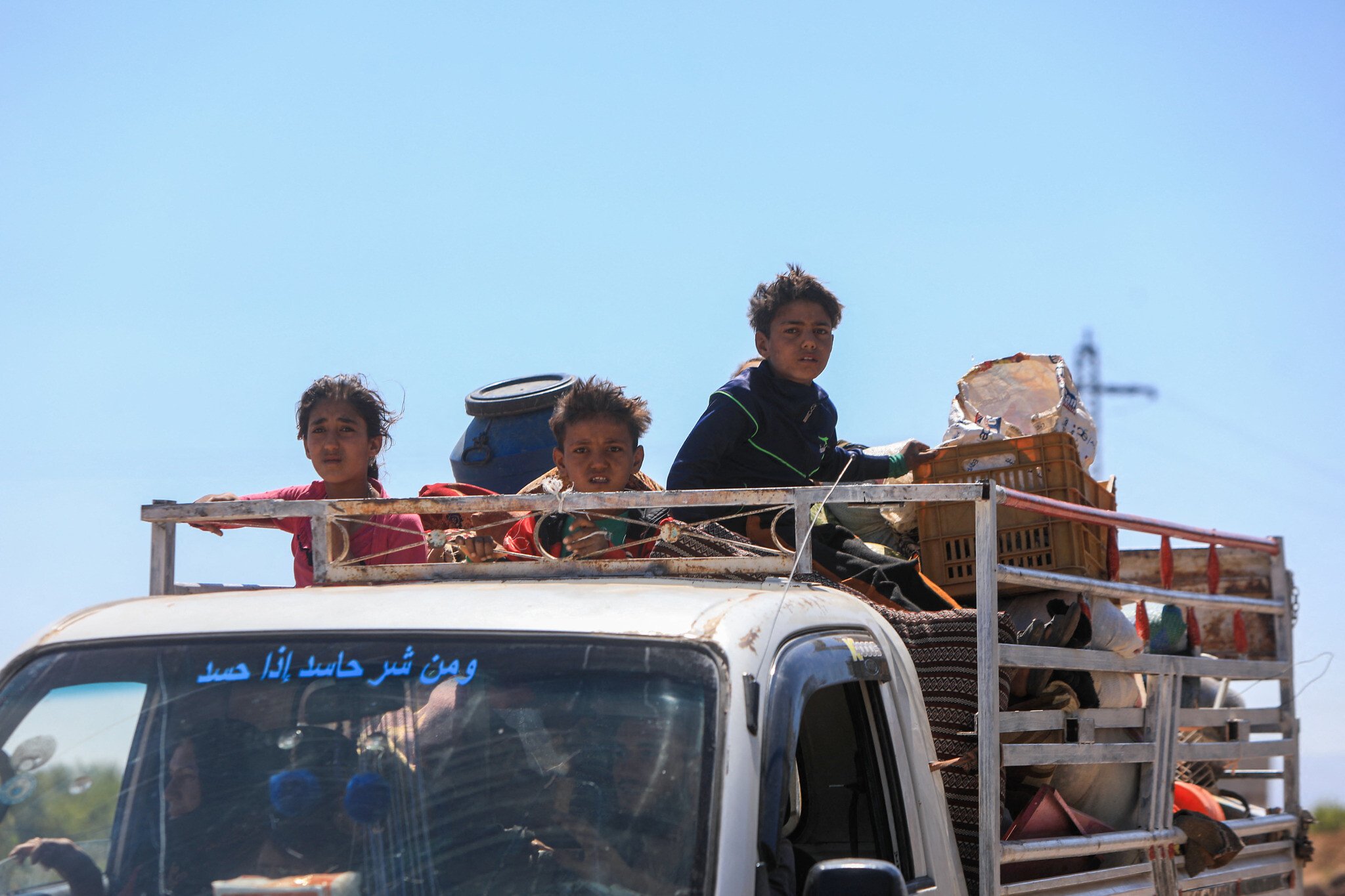
Prime Minister Benjamin Netanyahu said Thursday that Israel will continue to use military means to enforce its two red lines in Syria — the demilitarization of the area south of Damascus, near Israel’s border, and the protection of the country’s Druze minority there.
Netanyahu said the Damascus regime, led by President Ahmed al-Sharaa, violated both those red lines.
“It sent an army south of Damascus, into the area that should be demilitarized, and it began to massacre the Druze. We could not accept this in any way,” he said in a video statement.
The premier added that the ceasefire Sharaa announced in southern Syria’s Druze-majority Sweida province, which included the withdrawal of regime troops, “was achieved through force. Not through requests, not through pleas — through force.”
“We acted, and we will continue to act as necessary,” Netanyahu promised.
Israel attacked military facilities and operatives of the Syrian regime on Wednesday, demanding that regime troops withdraw from Sweida, to which they had deployed during sectarian fighting between Druze and Bedouins, which initially broke out after a Druze vegetable vendor was abducted by Bedouin gunmen on Sunday.
Israel’s own Druze community had demanded that Jerusalem act to protect their brethren across the border, as videos emerged from Sweida showing regime forces shaving Druze clerics’ mustaches, as well as stepping on Druze flags and pictures of religious clerics. Other videos showed Druze fighters beating captured government forces and posing by their bodies.
After the Israeli strikes on Wednesday, the Syrian army withdrew, saying it had reached a ceasefire with local Druze forces, and Sharaa vowed to protect the minority group — though some Druze factions said they rejected the arrangement.
But even in the wake of the truce, there were reports of renewed fighting, with both sides blaming the other.
A Bedouin military commander in Syria told Reuters that Bedouin fighters had launched a new offensive in Sweida against local Druze fighters, despite the ceasefire.
The commander said the truce in Sweida only applied to government forces, and that the Bedouin fighters are seeking to free Bedouins detained by Druze armed groups in recent days.
However, Syrian state media claimed that Druze groups in Sweida were carrying out massacres against local Bedouins, and some Bedouins said they were still fighting.
The Syrian state news agency published footage of displaced Bedouins fleeing the area and reporting that Druze had massacred civilians in the Al-Maqwas neighborhood.
The White House said Thursday that de-escalation of the conflict in Syria seems to be continuing. Spokeswoman Karoline Leavitt told reporters the US is “very actively monitoring the situation.”
A State Department official, who requested anonymity, told Reuters that there is no change in US policy toward Syria, but that “all parties must step back and engage in meaningful dialogue that leads to a lasting ceasefire.”
“The government must investigate all reports of abuse and hold the perpetrators accountable,” the official added.
US Secretary of State Marco Rubio said late Wednesday that the US had engaged all parties and steps had been agreed to end “this troubling and horrifying situation.”
The French foreign ministry said Thursday it called for the ceasefire in Sweida to be respected, for a probe into actions against minorities, and for Israel to stop unilateral action.
French foreign minister Jean-Noel Barrot has held talks in recent days with his Syrian and Israeli counterparts over the issue, the ministry said in a statement.
Meanwhile, Turkish President Recep Tayyip Erdogan’s office said that “Israel, using the Druze as an excuse, has been expanding its banditry into neighboring Syria over the past two days.”
“I want to state this once again, clearly and directly: Israel is a lawless, unruly, unprincipled, spoiled, pampered, and greedy terrorist state,” Erdogan said in a televised speech after his weekly cabinet meeting.
“At this stage, the biggest problem in our region is Israel’s aggression… If the monster is not stopped immediately, it will not hesitate to throw first our region, then the world, into flames,” he added.
Turkey backed the Islamist Hayat Tahrir al-Sham (HTS) group led by Syria’s new president — who previously went by the nom de guerre Abu Mohammed al-Jolani — even before the group toppled longtime Syrian leader Bashar al-Assad in December, taking over the state.
In a press conference Thursday evening, Israel Defense Forces Spokesman Brig. Gen. Effie Defri acknowledged that the IDF had been unprepared to handle the chaos on the Syrian border in recent days, during the Sweida conflict.
Around 1,000 Druze crossed from Israel into Syria, and dozens of Syrian Druze entered Israel, at the time of the fighting — leading several Druze Israeli lawmakers to themselves enter Syria to call on Israeli Druze to return to Israel.
Defrei said the IDF “were not prepared for thousands of Israeli citizens who reached the border and tried to pass it,” adding: “We are learning lessons.”
Police said they arrested two Druze Israelis at the Syrian border on Thursday morning, as they tried to reenter Israeli territory with a Kalashnikov rifle.
The two young men — ages 18 and 20, from the villages of Kisra and Beit Jann — crossed into Syria on Wednesday, seeking to rescue their coreligionists from the Bedouin and Syrian regime forces.
Police said that they patched up breaches on the Israel-Syria border and are currently working with local Druze leaders to facilitate the return of Israelis who crossed into Syria, and vice versa.
“Northern District officers, together with Border Police forces and other units, have been operating since yesterday in coordination with the IDF in response to recent events in the Golan Heights,” said a police spokesman.
Police detained the two young men for questioning, seizing the rifle and magazine, and will request an extension on their remand in court, the spokesman continued.
Syrian President Ahmed al-Sharaa’s interim government has had troubled relations with ethnic and religious minority groups since it came to power in December.
March saw massacres of more than 1,700 mostly Alawite civilians in their hub on the Mediterranean coast, with government-affiliated groups blamed for most of the killings.
Government forces also battled Druze fighters in Sweida province and near Damascus in April and May, leaving more than 100 people dead.
Israel, which is home to around 150,000 Druze, many of whom serve in the IDF, has repeatedly stated its intention to defend Syria’s Druze community.
The IDF, which has taken control of the UN-monitored demilitarized zone on the Golan Heights and conducted hundreds of strikes on military targets in Syria, also says it will not allow any Syrian military presence in the south.
Despite having initiated contact with a first face-to-face meeting in Azerbaijan earlier this month, Israel remains extremely wary of Syria’s new rulers, including Sharaa, whose Hayat Tahrir al-Sham movement was once linked to al-Qaeda.
Times of Israel staff contributed to this report.

